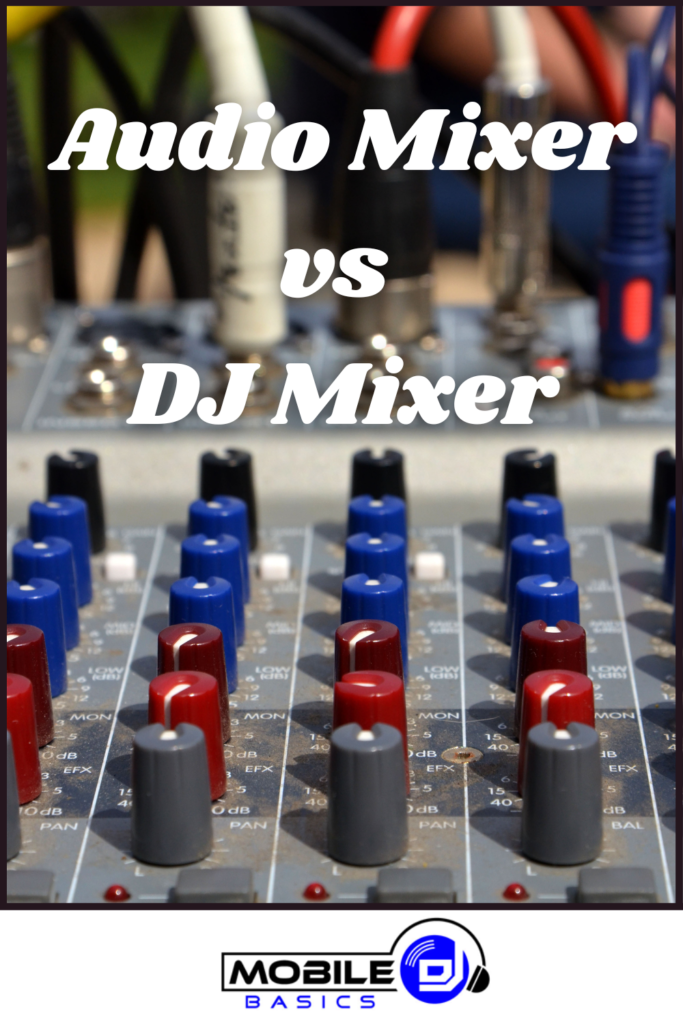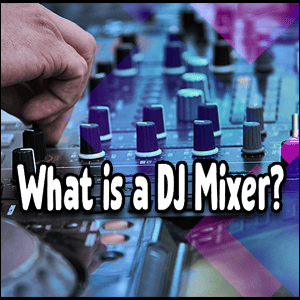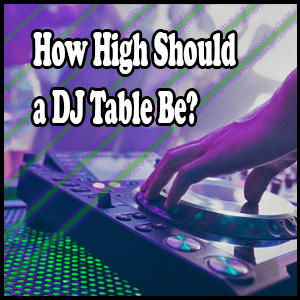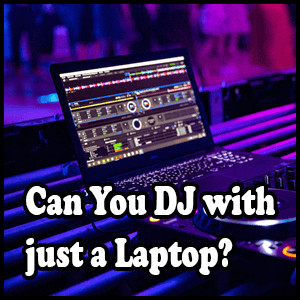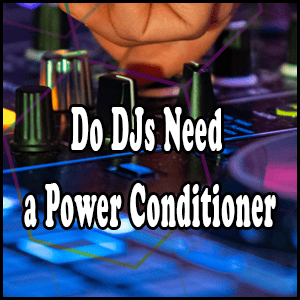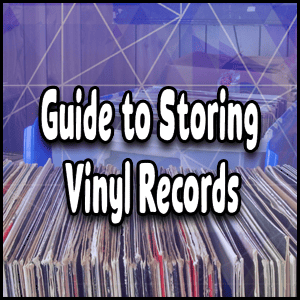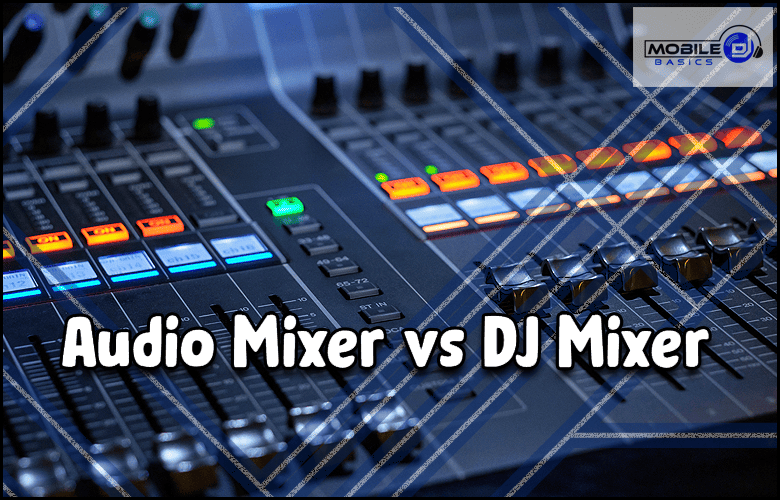
In this article, we’ll look at the differences between an audio mixer and a DJ mixer. We’ll check out how they work and their special features. Knowing these things can really help a musician or DJ pick the right gear for their sounds.
Our Main Points
- An audio mixer helps mix and edit sound from different places.
- A DJ mixer is made just for DJs to mix lots of sounds together.
- Audio mixers are great for recording spots and live music events.
- DJ mixers are the go-to for clubs, parties, and live DJ scenes.
- Which one you choose, audio mixer or DJ mixer, depends on your needs.
What is an Audio Mixer?
An audio mixer, also known as a sound mixer or mixing console, is a special tool. It combines and changes audio from many sources. People often use it in places like recording studios and at live events.
Each mixer has many channels. This lets you change the volume, the sound quality, and even effects of every sound. It can work with microphones, instruments, and music players easily.
Key Features
An audio mixer can do a lot to make sound better. Here are its key features:
- Audio mixers have multiple channels. This is great for mixing lots of sounds together, such as music and voices in live shows.
- They also have EQ controls. These controls help you adjust how high and low the sounds are. This makes the sound just how you want it.
- Audio mixers come with cool effects you can add to sound. Things like reverb, delay, or making the sound louder can make your mix sound amazing.
- You can listen to just one sound at a time with solo, or mute sounds with the mute buttons. This lets you focus on one sound or silence others when needed.
- There’s a special output just for listening while you mix. This helps make sure your sound mix is perfect by hearing it in real-time.
An audio mixer helps you be the boss of your sound. It’s great for anyone working with sound, from DJs and bands to making videos. An audio mixer makes your sound top-notch.
Features of an Audio Mixer
An audio mixer is a must-have for music and sound fans. It’s full of cool things. Here’s what it does:
- Multiple Channels: It has many channels. This lets you mix various sounds at once. You can blend music, singing, and more smoothly.
- EQ Controls: Mixers come with EQ knobs. They help you change how sounds come out. You can make songs sound just right.
- Effects Processing: These mixers can also add cool effects. Imagine adding a little echo or making sounds shimmer. It’s fun!
- Auxiliary Sends: Mixers have extra sends, too. They’re good for making special mixes for those playing music. Or for adding extra effects.
- Pan and Balance Controls: With these knobs, you can place sounds in different spots. It makes your sound world feel wider and deeper.
- Master Fader: The big volume knob is very important. It controls how loud everything comes out. This makes sure your sound is just right.
- Phantom Power: Some mixers can power special mics. This is great for certain microphones that need a little extra power.
If you love music, sound, or making podcasts, you need an audio mixer. It gives you the power to make amazing sound shows.
What is a DJ Mixer?
A DJ mixer is made just for DJs. It helps blend sounds from different tracks while they play. You find them in clubs, at parties, and any place where DJs work live.
With a DJ mixer, DJs can change songs smoothly. They can make amazing mixes and add cool sounds to their music. You’ll find many different buttons and settings on these mixers for DJs to use.
One big thing a DJ mixer can do is beatmatch. This means DJs make sure two songs play at the same speed. It helps the music sound like it’s never stopping, and it keeps the crowd loving the music.
There’s also a special part called the crossfader. It lets DJs mix between two songs without a rough stop. This makes sure the music keeps flowing smoothly.
“The DJ mixer is key for any DJ. It allows them to mix songs in real time, showing their own style. This gets everyone dancing.”
DJ mixers have more cool features. They can change the music’s sound, add filters, or special effects. This helps DJs make their mixes sound just how they want. It makes the music awesome for everyone listening.
A DJ mixer is super important for DJs. It gives them everything they need to make great music. It’s their main tool, from playing at clubs to big festivals. A DJ wouldn’t go without one.
Features of a DJ Mixer
A DJ mixer has features made for DJs to do more and be better. Here are some top features:
- Multiple Channels: DJ mixers let DJs connect many audio sources at once. This makes playing songs smoothly and mixing them fun.
- Crossfader: The crossfader is very important. It lets DJs switch between songs in a smooth way. This means no breaks in the music.
- EQ Controls: EQ controls help make the sound just right. DJs can shape the sounds of each song. This makes sure that all the songs sound good together.
- Effects and Filters: DJ mixers have cool effects and filters to use on the music. DJs can make their mixes sound unique and fun.
- Input and Output Options: DJ mixers have many ways to connect different music devices. They include places for microphones and can connect to big speakers too.
These features help DJs mix and play music the way they like. DJ mixers are great for parties or big shows. They give DJs lots of control, making their music exciting.
Here’s a look at the Pioneer DJM-900NXS2, a top DJ mixer in action:
We’ll soon talk about how audio mixers and DJ mixers differ. This will help you pick the right one for your music.
Differences Between Audio Mixer and DJ Mixer
Audio mixers and DJ mixers may seem alike, but they serve different needs. Knowing these differences is vital when picking the right mixer for you.
1. Purpose: The main goal of an audio mixer versus a DJ mixer is what stands them apart. Audio mixers shine in studios, live shows, and music production, perfect for musicians and engineers. DJ mixers, on the flip side, are made just for DJs, letting them mix music at places like clubs and parties.
2. Inputs: Audio mixers handle a variety of inputs, like mics and instruments, letting you tweak live sounds. DJ mixers are all about pre-recorded tunes, with features for turntables and CDJs. They are built to work with DJs.
3. Features: Audio mixers have a lot of tools for shaping and changing sounds. They come with EQs, effects, and more. In contrast, DJ mixers focus on smooth transitions and unique mixing with things like crossfaders and EQ isolators.
4. Size and Portability: Due to their many features, audio mixers are big. Their job isn’t to be carried around. DJ mixers, however, are small, light, and easy to take with you for DJing on the go.
5. User Interface: Audio mixers can look quite complicated. They have lots of knobs and controls for adjusting sound just right. DJ mixers, by comparison, are designed for speed and ease during a performance. They offer a simple setup for DJs to use quickly.
Note: Make sure you know what you need from a mixer before choosing. Think about the kinds of sounds and features you’ll use and where you’ll use the mixer.
| Audio Mixer | DJ Mixer | |
|---|---|---|
| Purpose | Recording, live shows, audio production | DJ performances, club settings |
| Inputs | Microphones, instruments, playback devices | Turntables, CDJs, media players |
| Features | Extensive signal processing, EQ, effects | Specialized DJ controls, crossfaders, EQ isolators |
| Size and Portability | Larger, less portable | Compact, lightweight |
| User Interface | Complex with multiple controls | Simplified layout for DJ performance |
Choosing the Right Mixer
When picking a mixer for your sound, think about what you need it for. Musicians and producers like audio mixers for shows and recordings. They have lots of features to mix different sounds well.
Audio mixers let you connect mics, instruments, and music players at the same time. This helps a lot during live shows. You can adjust the sound with EQ and effects, making everything sound just right.
“The audio mixer’s versatility and control make it suitable for handling the dynamic nature of live performances.”
But if you’re a DJ, you might want a DJ mixer instead. DJ mixers are designed for playing music smoothly. They’re perfect for clubs and parties, where the music needs to flow just right.
DJ mixers have special features for DJs, like crossfaders and looping. These let DJs play with the music, matching beats or doing cool things like scratching.
“DJ mixers cater to the specialized needs of DJs, allowing them to deliver seamless transitions and captivating performances.”
Considerations for Choosing the Right Mixer
Considering an audio or a DJ mixer? Think about these:
- Your main use: Do you work more with live sounds or recorded music?
- How many things do you need to plug in at once?
- How much adjusting of levels and effects will you need to do?
- Make sure it works with your other gear.
Think about these points to help you pick the best mixer for you. Both types of mixers are key for making great music. They help musicians, producers, and DJs turn their ideas into amazing sounds.
| Audio Mixer | DJ Mixer |
|---|---|
| Designed for live performances and recording | Specifically tailored for DJs and live DJing environments |
| Provides extensive control over inputs, EQ, and effects | Focuses on features like crossfaders, looping, and beat syncing |
| Handles various audio sources, including microphones and instruments | Primarily used for blending and mixing pre-recorded music |
Conclusion
When picking between an audio mixer and a DJ mixer, think about your needs. Both have special features for different audio tasks.
If you make music or produce, and usually perform live, an audio mixer is for you. It offers many controls and inputs to get the sound you want.
But, if you’re a DJ who mixes music at events, you need a DJ mixer. It has crossfaders, effects, and controls for smooth mixes and creativity.
Think about what you need, your budget, and how you’ll use it. Knowing the differences can help you choose well and improve your sound, no matter the occasion.
